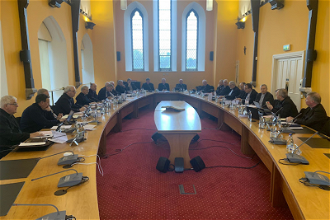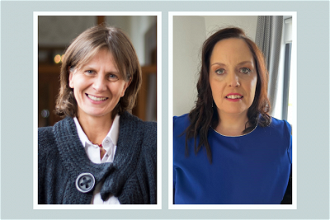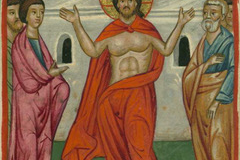Catholic Bishops' statement on Fertilisation and Embryo Bill
The final stages of the Human Fertilisation and Embryology Bill will be debated after Parliament resumes on 6th October. Some MPs have tabled amendments to this Bill to liberalise the abortion law, and there is a real risk that some of these amendments might be passed by the House.
The Archbishop of Cardiff, Archbishop Peter Smith, Chairman, Department for Christian Responsibility and Citizenship, has sent the following information to all parishes in England and Wales, on behalf of the Bishops' Conference.
This Autumn will see the final stages of the Human Fertilisation and Embryology Bill in Parliament. There is a real possibility the law will be changed to make access to abortion easier. The Bishops of England & Wales are offering the following guidance on the issues and what you can do.
Cherishing Life
The Church teaches clearly that every human life must be respected and protected from conception. The first victim of abortion is the unborn child. The woman is also a victim for she loses her child but is unable to grieve effectively. The Church 'does not doubt that in many cases it was a painful and even a shattering decision.' (The Gospel of Life, paragraph 99) There may be financial or other pressures so strong that a woman 'feels psychologically forced to have an abortion.' (The Gospel of Life, paragraph 59). It is important to find practical ways to support women so they are not rushed into making harmful choices but are helped to make life-affirming choices.
What is the law at present?
The Abortion Act 1967, as amended in 1990, allows abortion up to 24 weeks if two doctors certify that the risks 'of injury to the physical or mental health' to the mother or her other children, are less with abortion than with childbirth. If there is a substantial risk that the child is disabled, then abortion is allowed up to birth. The abortion must be carried out by a doctor and in a hospital or premises specifically approved by the Secretary of State.
Why is it important to act now?
For only the second time since 1967 the government is sponsoring a bill which will allow amendments on abortion. Last time this happened, in 1990, the law on abortion changed significantly and it could change again now. Attempts have already been made to use the Bill to change abortion law, so far without success. MPs have tabled a further 23 amendments. Any or all of these could be voted on next month.
What are the key amendments that have been tabled?
To remove the 'mental health' clause and permit abortion on demand up to 24 weeks
To remove the need for two doctors to authorise abortion
To allow nurses and midwives to perform abortion, even late surgical abortion
To permit abortions anywhere that health services are offered
To allow abortion drugs to be taken at home without medical supervision
To extend abortion law to Northern Ireland
And some positive amendments to ensure that women have access to counselling
How real is the danger?
These amendments have been tabled. They may be debated and incorporated into
the Government Bill. If conscientious people do not act, there is a very real danger
that the law on abortion will become even worse than it is now.
Extreme proposals
The Abortion Act 1967 was intended to solve the problem of 'back street' abortion; as an exception for difficult cases. These proposals, in permitting abortion on demand without any health-related justification, remove every vestige of protection for the unborn child. Women are also abandoned. Not all abortions are requested by mature women who know exactly what they want. Many are requested by young and vulnerable women under intense pressure and often in isolation. These proposals could lead to girls as young as 14 taking abortion pills at home, alone, without any medical supervision. There would be no need for a doctor's involvement as the doctor could certify without seeing the girl and a nurse could dispense the pills.
Catholic Bishops' Conference of England and Wales
Human Fertilisation and Embryology Bill
2
Public opinion
In 2007 there were over 200,000 abortions in England and Wales. The vast majority of people in England and Wales (over 80%) think that we should be seeking ways to make abortion less common, not finding ways to make abortion more widespread. Most people (68%) are opposed to nurses performing abortions, and the British Medical Association also voted against this. The Royal College of Nursing is officially in favour, but has not consulted the majority of its members. Similarly most GPs (over 75%) do not want their surgeries turned into abortion clinics.
What are the arguments of those who wish to see abortion made easier?
Their argument is that by making abortion quicker and easier they are helping women. They allege that the current system causes delays.
What are the counter arguments?
There is no evidence that the current law causes significant delays for women seeking abortion. In fact, according to government statistics 70% of abortions were carried out before 9 weeks and 90% before 13 weeks gestation. Over the past 10 years the percentage of early abortions has steadily increased. Abortion, at whatever stage of pregnancy, is a very serious decision and not one that women should be rushed into. The system should provide a breathing space, access to counselling and information about alternatives, so that no woman feels forced to choose abortion. The requirement for a health-related justification; for two doctors to sign; for a doctor to perform the abortion; and for it to be done in a hospital, reflect the seriousness of abortion. Removing these requirements leave women and unborn child exposed to great dangers. We should be taking abortion more seriously not less seriously.
What can be done?
It is important that as many people as possible write urgently to their MP. If you have time you might also write to the Prime Minister.
Who is my MP and how do I make contact?
You can find the name of your MP online at www.parliament.uk/people/index.cfm or from the House of Commons Information Office: 020 7219 4272
You can write to your MP at the House of Commons, London, SW1A 0AA or email through www.writetothem.com
What should I write?
Letters are most effective when they are written in your own words and express what you are most concerned about. For example, if you are a nurse, say so, and say if and why you would not want nurses to do abortions. Most of these amendments would make abortion more widespread, would lead to women having less time to think before abortion, and leave women facing abortion at home and alone without medical supervision. They would also remove the last vestige of protection for the unborn child. How do you feel about this?
Pray because it all depends on God but work as though it all depends on us.
Further information can be obtained from www.catholicchurch.org.uk





















